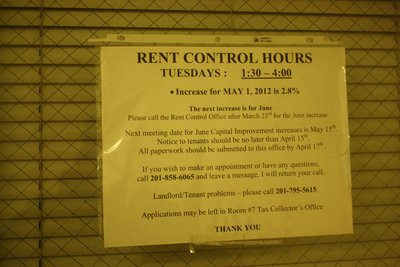A local tenants’ group resubmitted petitions to City Hall on March 9 that would put the matter of whether to gradually end rent control in Bayonne to a public vote.
Last year, the Bayonne City Council passed an ordinance that would void rent control on an apartment once the current residents move out. Eventually, this could have the effect of eliminating all rent control citywide.
Howard Moskowitz, the attorney representing the Bayonne Tenants Organization, which is leading the fight to undo the ordinance, resubmitted petition signatures to the city clerk on March 9. The group had submitted signatures in December, but these were invalidated because of a technicality. This time, the group collected 1,025 signatures. Only 845 were required to get the question put on the ballot.
“We got roughly the same amount as we gathered the first time, but in two thirds the time,” Moskowitz said last week. “Even though this was a mild winter, this was not easy.”
Earlier this month, Hudson County Superior Court Judge Hector Velazquez ruled in favor of the city of Bayonne, saying the petitions were invalid – but gave those filing the petition 14 days to gather new signatures that would allow the matter to be voted on as a public referendum in November of 2012.
Normally, once those petitions are accepted, the City Council would have 20 days to introduce an ordinance that would repeal the ordinance it passed in December, pending the vote. But Moskowitz said these unusual circumstances and the law is not clear. So he filed a motion with the Superior Court Appellate Division to require the city obey the usual time frame.
He also filed an appeal of the original ruling with the state, saying that the original ruling was wrong and that the original signatures should have been honored.
“We don’t want this happening to anybody else,” he said.
City Clerk Robert Sloan, who received the signatures and would determine if they are valid, said a special election will have to be called if the council does not act to repeal the changes to rent control made in December. This, he said, will be within a short period of time, and will cost about $250,000 to pay for poll workers and transportation of election machines and use of polling places.
“We got roughly the same amount as we gathered the first time, but in two thirds the time.” – Howard Moskowitz
__________
Second attempt
This is the city’s second attempt to do away with rent control.
The council introduced an ordinance in July that would eliminate rent control on an apartment in which landlords made certain improvements. Ultimately, they withdrew the ordinance, then replaced it with one that eliminates rent control on an apartment if the current tenant moves out.
Rent control limits increases to the cost of living increase each year, usually a few percent, and imposes other rules on rents and rent hikes in the city.
The City Council said the change is needed in order to encourage landlords to upgrade an aging and deteriorating stock of apartments.
Protects tenants
Under the ordinance the City Council passed in December, said City Attorney Charles D’Amico, apartments would lose their rent control status only once the current residents move out.
Betsy Parks, who is leading the coalition to roll back the changes, said rent control is the most important protection tenants have.
While rent control has its roots in the early 1900s, its modern roots come out of a rent freeze imposed nationwide during World War II. When the freeze was lifted, New York City and a few other cities enacted their own rent control laws to prevent skyrocketing rents.
Contemporary rent control evolved out of the Civil Rights movement. New Jersey is one of four states that gives communities a local option to pass rent control laws. About 100 cities in the state still have some version of rent control, although it is seen as something being phased out.
While some residents object to the change the City Council voted to make, the new ordinance isn’t drastically different from an ordinance the city has had in place since the 1970s. Landlords have already taken advantage of a loophole in local law that says that if someone moves out of an apartment and that apartment remains vacant for six months, the apartment is automatically removed from rent control.
Some landlords have been deliberately keeping apartments vacant in order to escape rent control, and this reduces the number of available apartments in the city. By doing away with the six-month wait, the ordinance would likely increase the number of available rentals citywide.
